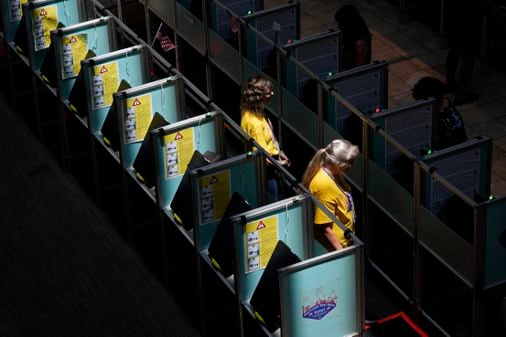WASHINGTON (AP) — U.S. officials tracking disinformation campaigns say they have issued more warnings about foreign groups targeting political candidates, government leaders and others in recent months as America's adversaries try to influence the outcome of the 2024 election.
An official from the Office of the Director of National Intelligence said Wednesday, without providing details, that the figure is higher at least in part because “presidential elections attract greater attention from adversaries.”
One of the officials, who spoke to reporters on condition of anonymity due to ground rules set by the attorney general's office, said the increase in individual notification of targets that began last fall could reflect an increased threat, improved government detection capabilities or both.
Lawmakers from both parties have expressed concerns about the nation's preparedness for foreign disinformation during a presidential election and the negative impact it could have on voter confidence and faith in our democratic institutions. They have also questioned the federal government's ability to provide timely and effective warnings to voters when countries like Russia and China are using disinformation to try to sway American politics.
Influence operations can include false or exaggerated claims or advertisements intended to mislead voters about a particular candidate, issue, or race, and can also include social media posts and other digital content intended to suppress voting through intimidation or provide voters with false information about election procedures.
The list of countries that have launched such campaigns includes familiar adversaries such as Russia, China and Iran, as well as a growing number of second-tier nations such as Cuba, the officials said, and there were signs that some U.S. allies were launching their own efforts to influence voters.
One official said Russia was the biggest threat, and its main goal was to undermine public support for Ukraine and confidence in American democracy more generally.
Officials say China is believed to be more cautious than Russia in its online disinformation campaigns and more concerned about a potential backlash from the U.S. Iran is considered a “source of chaos” and is likely to try online tactics to stoke voter anger and even violence.
Officials did not say how many private warnings they had issued to candidates, political groups or local election offices. The warnings come after a joint committee of intelligence officials concluded that influence efforts could be used to sway the outcome of elections or discourage certain groups from voting.
The official said the notification would only be made if authorities were able to attribute the basis of the operation to a foreign source, allowing targeted individuals or groups to “take a more defensive posture.”
The unit within the intelligence community leading the effort, the Center for Foreign Malicious Influence, has no jurisdiction over domestic entities, and officials briefing reporters on Wednesday said they were trying to avoid the appearance of policing Americans' speech or playing favorites when it comes to candidates.
The only time intelligence agencies have previously issued a public warning was in 2020 when groups with ties to Iran were suspected of sending emails to Democratic voters threatening them to vote for Donald Trump.
Powerful artificial intelligence programs that can quickly create images, audio and video are posing a growing problem as authorities seek to use the technology to create lifelike fakes that could easily mislead voters.
The use of AI has already emerged ahead of elections in India, Mexico, Moldova, Slovakia and Bangladesh, and in the US, some voters in New Hampshire received an AI robocall that imitated the voice of President Joe Biden.
Officials said AI deepfakes used by U.S. adversaries remain the biggest threat.

